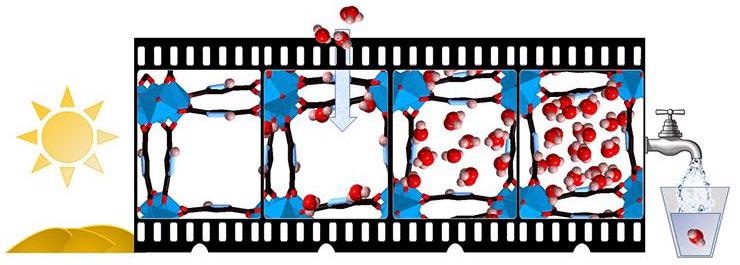Extracting drinking water from the air in a desert might sound like science fiction, but in fact it can be possible sooner than we think. The solution can be found in a new material class with exceptional properties - Metal-organic frameworks (MOF), that more and more people are talking about. At Chalmers University of Technology, there are researchers with leading expertise in the field.
 Metal-organic framework. Image Credit: Chalmers University of Technology
Metal-organic framework. Image Credit: Chalmers University of Technology
Metal-Organic Frameworks (MOF) appeared in the 1990s and today chemists have produced around 80,000 MOFs with different properties – a uniquely rapid development. A group of researchers led by Professor Lars Öhrström and Dr. Francoise Amombo Noa at the Department of Chemistry and Chemical Engineering at
Chalmers, have been studying this area for many years and are often engaged as experts internationally.
“Metal-Organic Frameworks is one of our most promising areas for developing many of the sustainable technical solutions that the world needs. But this is about more than applications. It is a fundamental revolution in how we look at the solid state” says Lars Öhrström.
Outstanding Properties for Capturing and Separating Substances
A MOF is a solid, porous substance built by metal ions that are linked together with organic molecules to form a network - a molecular version of the model kit mekano.
The networks have large internal holes where you can put things in and take things out, which gives them very good properties for efficiently capturing or separating different substances. Researchers see great potential for the use of MOFs in many different important areas, such as biogas storage, carbon dioxide capture, controlled delivery of drugs - so-called drug delivery - and for the destruction of chemical weapons.
Recently, commercial use of MOF-materials has begun to emerge, to store toxic gases used in the electronics industry and in the form of so-called crystal sponges for research applications in the pharmaceutical industry.
Great Progress for the Technology in a New Study
An area where MOFs can contribute to a revolutionary development is the extraction of water from desert air. In this context, the MOF act as a sponge in which water can easily slip into and then be stored in the materials voids. The problem which the researchers are struggling to solve is that it takes a lot of energy to release the water. But now American and German researchers have managed to get an MOF to release the water at 10 degrees lower temperature than before and have been able to show in detail how the water molecules are collected. The study is a major step forward in the field and was recently published in the scientific journal Science. Lars Öhrström was invited, together with the colleague Francoise Amombo Noa, to comment on the work as experts in an article that was published in the same issue of Science.
“So far, this technology is only available at the pilot scale, but fully developed, it could make extracting drinking water in desert areas possible. The wider consequences that this can have are even greater. Technology that allows us to use phase transitions of water from gas to liquid is important in everything from desalination of seawater to controlling the indoor environment in buildings” explains Lars Öhrström.
In a newly started project, his research group will develop MOF:s to purify water from environmentally harmful highly fluorinated substances, PFAS, together with colleagues at the Swedish University of Agricultural Sciences, SLU.
The researchers at Chalmers are also contributing to spread the knowledge about MOF:s in broader context. On behalf of the American Chemical Society ACS, Lars Öhrström and Francoise Amombo Noa have written a textbook aimed at master's and doctoral students that was published last year. Another group that could benefit a lot from this knowledge are researchers who work more applied in areas where you see great potential for MOFs, such as civil engineering and biotechnology.
Before we can reach a large scale use of MOF:s, the researchers needs to address their sometimes lower thermal and chemical stability. To tackle this issue the group at Chalmers, in collaboration with colleagues at the University of Gothenburg, Uppsala University, the University of Southern Denmark and the company Rigaku in Germany, have studied how the networks' design affects the properties and discovered MOFs where the metal ion networks are in form of sheets. They presented their results in an article that was published in the scientific journal Chem, last summer.
“We propose a new strategy for more stable MOFs and hope that the study will contribute to a much-needed progress in the evolution of this area”, says Francoise Amombo Noa.
In the study, the researchers also proposing a new approach towards MOF:s and a common nomenclature in the field.
“How we describe, name and talk about these materials affects how we think about them and thus our opportunities to use them in real applications”, adds Lars Öhrström.
The illustration shows how water molecules can be captured from desert air in metal-organic frameworks (MOFs), stored in the materials voids and surfaces and released as water. So far, this technology is only available at the pilot scale, but fully developed, it could make extracting drinking water in desert areas possible.